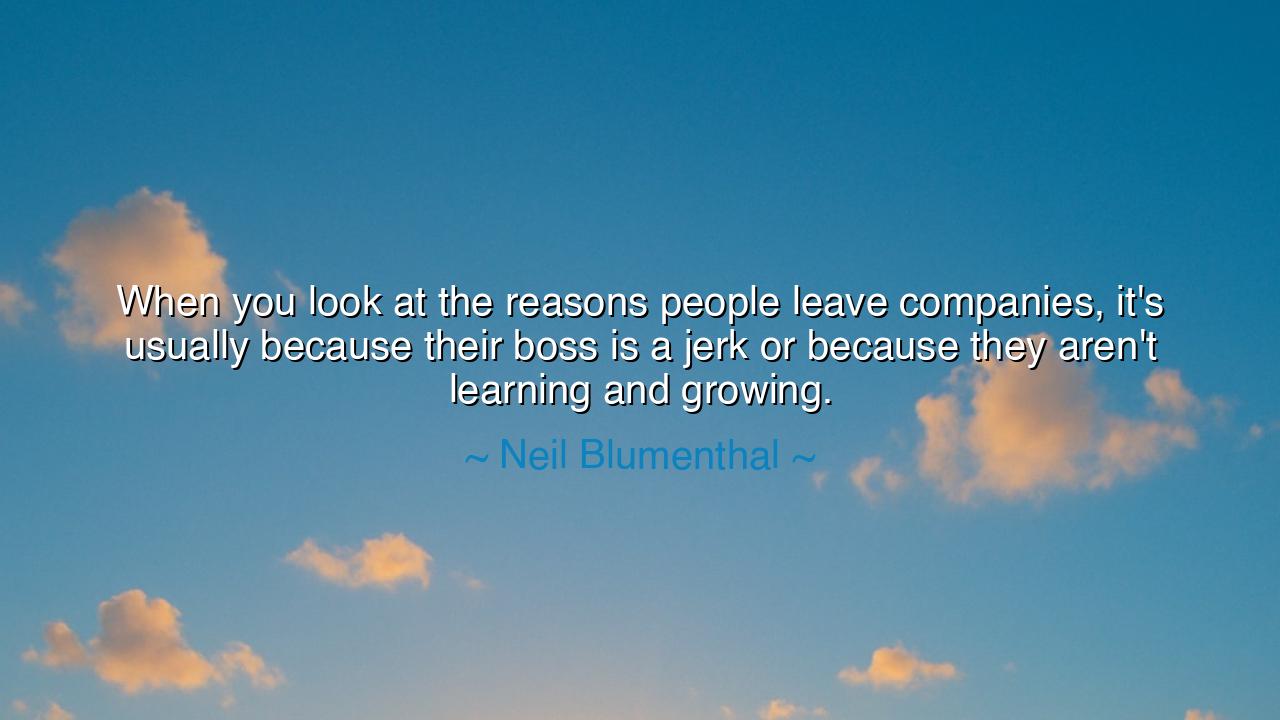
When you look at the reasons people leave companies, it's usually
When you look at the reasons people leave companies, it's usually because their boss is a jerk or because they aren't learning and growing.






“When you look at the reasons people leave companies, it’s usually because their boss is a jerk or because they aren’t learning and growing.” — Neil Blumenthal
In these candid and piercing words, Neil Blumenthal, the visionary entrepreneur and co-founder of Warby Parker, reveals a truth not only about work, but about the very nature of human purpose. He speaks of the two forces that most powerfully govern human fulfillment in any craft or calling: respect and growth. When either is absent, the spirit withers. The workplace, he reminds us, is not merely a machine of labor; it is a field of relationships and learning — a place where souls either blossom or decay. Thus, when a person leaves a company, they are rarely fleeing tasks or titles; they are escaping stagnation and the wounds of disrespect.
The origin of this insight lies in Blumenthal’s own experience building an organization rooted in empathy, curiosity, and purpose. In founding a company that disrupted the eyewear industry, he saw that success was not born from profit alone, but from people — from their creativity, loyalty, and capacity to grow. Yet, he also observed that no amount of vision or innovation can survive under poor leadership or a culture that starves learning. His words remind us that the leader’s duty is not to dominate, but to cultivate; not to demand, but to develop. A workplace where the human heart is valued becomes fertile ground for excellence; one where arrogance reigns becomes a wasteland of wasted potential.
The ancients, too, knew this truth. In the courts of kings and the academies of philosophers, they understood that the vitality of a people depends upon the virtue of their leaders. The Greek philosopher Aristotle, in his teachings on ethics and politics, wrote that the good ruler is a gardener, tending the growth of others. But the tyrant — cruel, self-centered, or blind to the dignity of those beneath him — poisons his own realm. So it is in every company, every institution, every human circle: the leader’s character shapes the destiny of those who follow. When leadership becomes tyranny, the wise do not linger; they depart, seeking places where their minds and spirits may continue to learn and grow.
Consider the story of Alexander the Great and his tutor, Aristotle. The young conqueror’s early greatness sprang not from ambition alone, but from the guidance and learning he received under his teacher’s care. Aristotle taught him not only strategy and science, but the art of understanding men. Yet, when Alexander’s empire grew vast and pride consumed him, he ceased to listen. He surrounded himself with flatterers, dismissed counsel, and treated his once-beloved companions as subjects. In that moment, his growth ended — and with it, the harmony of his empire. His soldiers, weary of arrogance and bereft of purpose, began to leave him, not merely in body but in spirit. So it is that even the mightiest leader, if he ceases to learn or causes others to shrink beneath him, loses all that truly matters.
Blumenthal’s words, though spoken in the language of modern business, carry this same ancient wisdom: that people do not abandon their work lightly — they abandon injustice and stagnation. The “jerk boss” of his quote is not merely an unpleasant personality; he is a symbol of the small-minded ruler who commands without compassion, who forgets that leadership is service. Such a person drives others away, not through orders, but through the coldness of the heart. Yet equally harmful, says Blumenthal, is the absence of learning — for the mind, when denied growth, begins to despair. Human beings are not meant to remain static; we are creatures of progress, forever reaching for greater understanding. To work without learning is to live without becoming.
In this light, the workplace — or any shared endeavor — must become a school of the spirit. Every day should be an opportunity to refine one’s craft, to explore one’s potential, to challenge one’s limits. A true leader is a teacher as well as a student — one who listens, uplifts, and ignites the curiosity of others. Where this spirit thrives, the team becomes a community, and the work becomes a shared art. But where growth is ignored and dignity denied, the flame of purpose flickers and dies. The wise will not stay where their light is dimmed; they will seek new soil where they may bloom again.
So, dear listener, let this teaching be your compass: in your work, honor people as much as results. If you lead, lead with humility and a desire to help others grow. If you follow, choose to walk among those who challenge and inspire you. For learning and respect are the twin pillars of every thriving endeavor — and when they are absent, even gold becomes dust. As Neil Blumenthal reminds us, it is not riches or prestige that make a life worth living, but the freedom to learn, the joy of growing, and the grace of being led — or leading — with heart.






AAdministratorAdministrator
Welcome, honored guests. Please leave a comment, we will respond soon